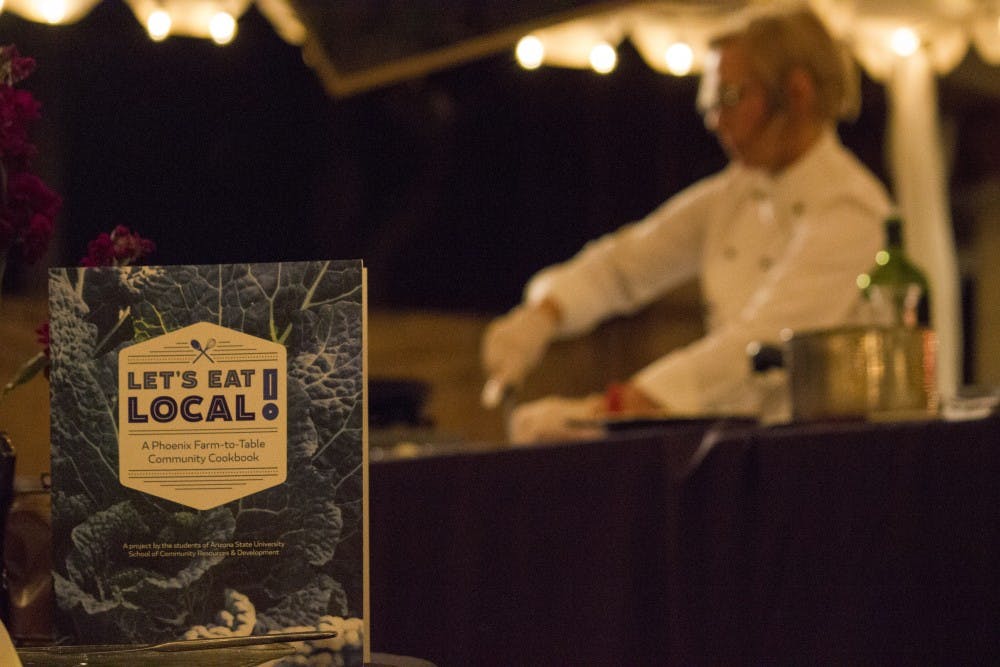ASU students are cooking up a new way to fight food insecurity in Phoenix.
Last spring, Dr. Sandra Price’s annual non-profit leadership and management service learning class created "Let’s Eat Local," a bilingual cookbook, after learning there are 55 areas in Maricopa County that have inadequate food access.
The students learned there were food deserts, areas where there are no places to buy fresh foods within a number of miles, throughout the Phoenix area. People living in these impoverished areas sometimes don’t have access to vehicles and therefore don’t have access to any fresh food. As a result they may end up purchasing groceries from local convenience stores.
Earnest Garcia, parks and recreation management senior, took NLM 435 last spring and was deeply involved in the creation of the cookbook and the research the class did on food insecurity in the Valley.
“People are going to get their groceries from Circle K’s from QT’s,” Garcia said. “If you’ve seen in gas stations, they have bananas and apples, that’s where they’re getting their produce from. That’s not a great way to get your produce and the four or five bananas they have in there aren’t going to feed the entire community.”
The class wanted to bring local produce into the homes of people living in areas without accessible grocery stores or farmer’s markets, but they quickly realized the lack of food markets in the area was only half of the problem.
“The other problem we found out was places would donate food to residents in the area, fresh produce, and a lot of them wouldn’t know what to do with it, so it goes to waste,” Garcia said. “We wanted to solve the problem of them being able to use the food they were being given and at the same time become more aware of how to use the local produce, so we can get those farmer’s markets to come in.”
It then became clear the first step was giving people in food deserts an accessible method of learning to cook with local produce. The students in Price’s class approached chefs to contribute recipes and through a combination of crowd funding and USG allocations, they were able to print the cookbook by the end of the spring 2016 semester.
Since then, Price has been looking for groups to help bring the local produce into food insecure communities to go with the cookbooks. Each book sells for $30 but will be distributed in food insecure areas for free.
“We haven’t actually distributed any yet because unless we can find the produce to go with them, they’re not going to have access to the produce because there aren’t stores in these neighborhoods,” Price said.
Price is developing partnerships with organizations like The United Way, Phoenix Ivy Council and Maricopa County Food System Coalition to assist taking produce into food insecure areas in various ways. She has considered utilizing options ranging from cooking classes to local farmer’s markets.
Price’s next NLM 435 class will continue the project in spring 2017.
“I can’t tell you exactly what we are going to do but these are all of the things I’m going to lay on the table and then my students will decide which direction they want to go.” Price said.
Lisa Brisch, owner of personal chef business, Dinner Thyme, contributed recipes to the cookbook including fennel slaw, kohlrabi and radish salad and grilled eggplant parmesan.
“I don’t think it’s right that there are people that live among us that cannot eat healthfully because of their circumstances,” Brisch said. “We have plenty of food available. So, giving them the tools, trying to bring the food to them, but even when we bring the food to them they don’t know what to do with it, just adding to that knowledge helps them.”
After learning about the cookbook, Tempe Hackett House invited Brisch to teach a cooking class for their Sister Cities Program. Price and some of her students were invited to the event where community members ate and learned to cook a three-course seasonal meal. Price raised $310 for "Let’s Eat Local."
Price said Tempe Sister Cities plans to print 500 cookbooks free of charge and an additional 500 at a discounted cost.
Garcia said coordinating the project taught him valuable marketing, fundraising and public speaking skills and more.
"I've learned that you can get 300 'no's' and as long as you get one 'yes,' you can still make things happen."
Reach the reporter at cdhenry@asu.edu or follow @carlyhenry_on Twitter.
Like The State Press on Facebook and follow @statepress on Twitter.




